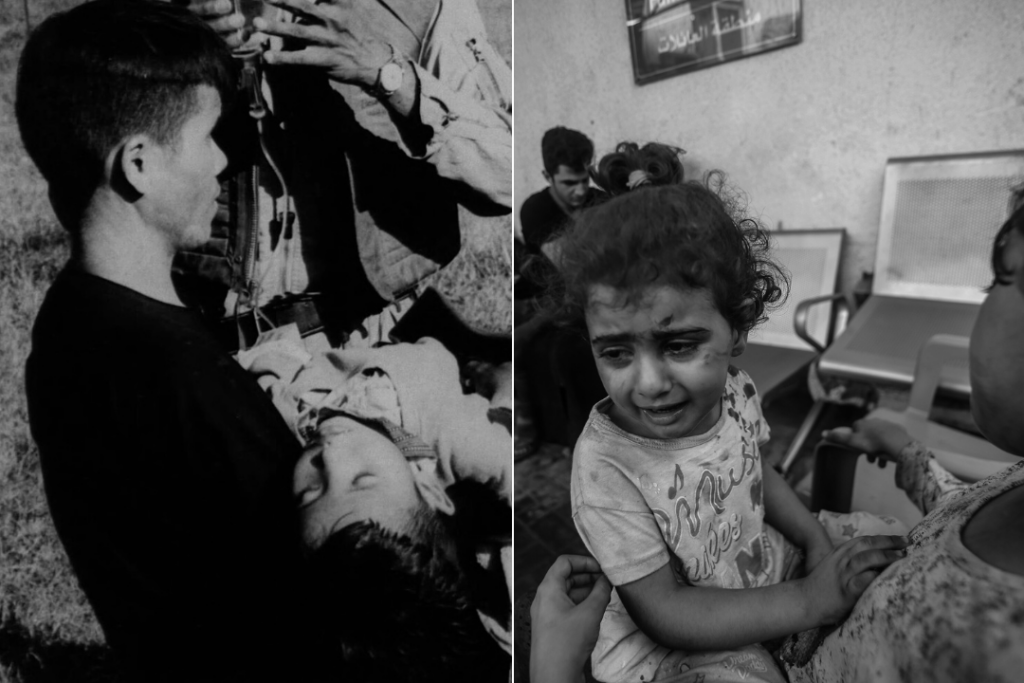Today marks 50 years since the Fall of Saigon – the day the Vietnam War officially ended and the country was declared “reunified.” But for many, it marked the beginning of something far more terrifying: the loss of home, the collapse of a way of life, and the terrifying unknown of what came next. Our father was one of the hundreds of thousands who fled, escaping persecution. He left behind everything he knew in search of safety and a future that would not be dictated by fear or an oppressive regime.
We inherited more than just our father’s name – we inherited his history. We grew up hearing fragments of war: stories of the My Lai Massacre, the Tet Offensive – stories of bombs dropping, of villages burned to ash. We mourned the loss of his family members, shared his pain in losing his father, our grandfather, who was senselessly killed for standing for justice, writing on the walls with his blood, rather than surrendering to those who stole his freedom.
We were raised with the knowledge that our father escaped a war so that we wouldn’t have to live through one – that his survival was our opportunity. The moment he stepped foot on that fishing boat over forty years ago, he was ensuring our family’s future, our name and our blood’s survival, fighting for a family he was yet to create.
And yet, the war never truly left our family. A generation later, that pain, exhaustion, and anger still manifests. These emotions ripple across the Vietnamese diaspora, surfacing in families like ours, and they speak across borders and generations. The gratitude for living without experiencing war first hand is not yet loud enough to erase the generational trauma.
Growing up with these stories, we felt the weight of a war that we never experienced, and we feel it again watching what is happening in Gaza. The grief, the displacement, the cries of children and the destruction of homes – it echoes too closely to home. For those of us who descended from war survivors, we are uniquely positioned to empathise with Palestinians suffering today, because we have lived in the aftermath of that kind of loss. That pain and suffering is not temporary – it will continue to echo into the lives of their children, and in generations yet to be born.
Gaza is not Vietnam. But while the circumstances differ historically and politically, the similarities cannot be overlooked. The way Vietnamese people and Palestinian people have been viewed by the global community feels eerily similar – as both victims and villains, depending on who is telling the story.
In both cases, civilians bore the brunt of the violence. The Fall of Saigon ended with chaotic evacuations and mass displacement of South Vietnamese people, with many becoming stateless refugees. In Palestine, mass displacement has also been a defining feature for decades. Repeated military operations and blockades have resulted in a humanitarian crisis, with many Palestinians becoming refugees in their land and abroad.
North Vietnam framed its conquest as liberation from imperialism, while South Vietnam saw it as occupation under a new regime. Mirroring the sentiment, Israel frames its actions as necessary self-defence against terrorism, while Palestinians experience them as acts of occupation and settler colonialism.
During the beginnings of the Vietnam War, the Vietnamese, particularly the North Vietnamese and the Viet Cong, were often vilified in Western media. Early coverage portrayed them as ruthless guerrilla fighters, small but cunning, even using women and children as decoys in war. At the same time, Vietnam was seen as an easy target – a poor, distant country that America and its allies would easily “liberate.” However, as the first war in history to be televised, the global perspective began to shift.
Soon enough, the vision of young children and women being bombed shifted the public’s perception, questioning if the war was even necessary. Protests began to grow loudly in all parts of the Western World, demanding that troops be withdrawn to stop the senseless killing of innocent Vietnamese civilians. Over time, Vietnamese people were viewed as a resilient people that, through years of bombing and displacement, overcame war and rebuilt. Even for the millions of refugees who fled following the Fall of Saigon, they were seen as survivors, preferring to brave the seas, pirates and death, than to surrender to the dismantling of democracy and rise of dictatorship.
And yet, we as a society have yet to learn our lesson. As the attack on Palestinians and occupation in Gaza roars on, the discourse has worsened.
The experiences of the Palestinian people are still contested. Palestinians are often seen through a lens of endless conflict – a crisis without resolution. Some parts of the world view them as victims of occupation and colonisation, while others, particularly in Western media, frame them primarily through the lens of terrorism or political instability. There is no clear ending, which keeps the narrative frozen in suffering, blame and dehumanisation.
Further, because of the unique beginnings of Israel, the world has now placed the oppression of Palestinians into a grey area. Pro-Palestinian stances – even when rooted in human rights – are frequently labelled controversial or even antisemitic. In many Western contexts, Palestinians are often caught in a dual perception, simultaneously victims of violence and also framed as a potential threat.
But just like the unique circumstances of the Vietnam War, in which perceptions of the Vietnamese were shifted through the televising of the war, Palestine today is experiencing its own shift. Social media is transforming who controls the narrative, who gets to speak and how quickly people can mobilise. Palestinians on the ground are speaking for themselves in real-time, posting videos, live streams, and sharing personal stories of the destruction and anguish they are experiencing on platforms accessible to everyone. Instead of being spoken for, Palestinians are now speaking back and being heard.
While the war in Vietnam ended 50 years ago, social media has helped challenge old American-centric war narratives, that people in foreign, non-Christian countries are potential threats, but really, are just people who all want the same thing, to live in peace, to believe what they want to believe, and allow their children to grow up.
As the daughters of a refugee, we live with a dual perspective – one foot in a story we didn’t live, and one in a world that keeps repeating it. Every day we are reminded of our father’s hardship and live in gratitude because of his sacrifice. Looking at the dad who raised us with so much love and who we look at with such admiration and adoration, it’s hard to believe he suffered and witnessed so much so many years before we were born. Looking at what is currently happening in Gaza, we see our dad in so many of the faces who are presently losing their families, their home, their land, their culture and their will.
The Vietnam War ended 50 years ago. Vietnamese communities around the world have since built new lives, found peace, and passed down the memory of war as stories, rather than as lived experiences. However, the people of Palestine have yet to experience that peace or see an end to the relentless assault on their homes, their lives, and their future. And in 50 years’ time, will we still be asking the same questions? Or will we once again look back, mourning another history that we failed to change?


